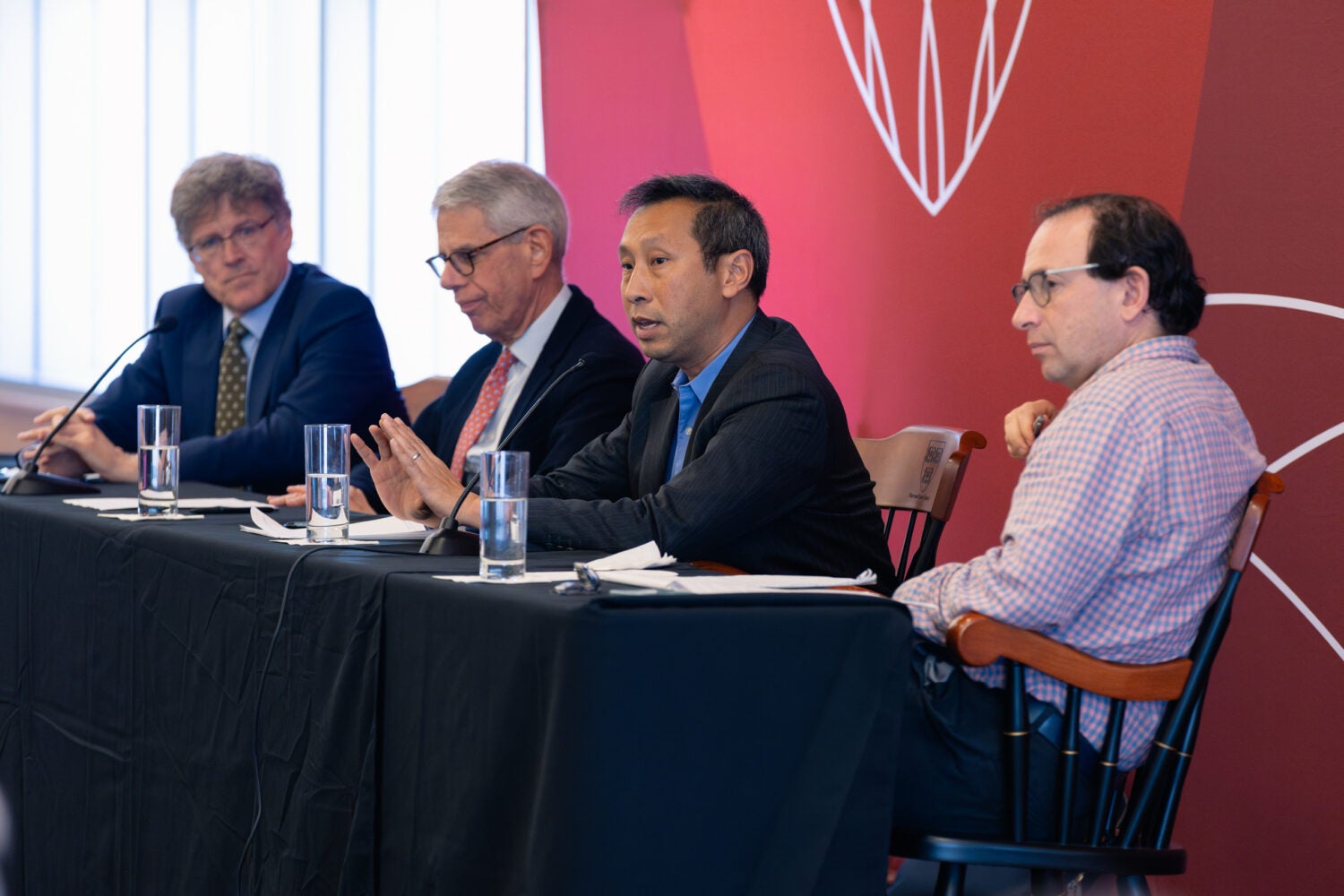President Donald Trump’s tariffs, coupled with a pause on enforcing a law intended to reduce international business corruption, are scrambling the world’s economic systems — and it could be a while before we see the full impact of these policies, according to four experts at a Harvard Law School event on April 14.
“We’re in a very different global economic situation than we’ve seen before,” said Mark Wu, the Henry L. Stimson Professor of Law.
Part of a Harvard Law series examining the first 100 days of President Trump’s second term, the panel explored the implications of the administration’s approach to business and trade, including tariffs and a law intended to curb bribery and graft.
Moderated by John Coates, the John F. Cogan, Jr. Professor of Law and Economics, the discussion began by examining the Foreign Corrupt Practices Act, or FCPA, a 1970s-era statute that prohibits American companies — or those that are foreign-owned but publicly traded in the U.S. — from bribing governments or officials to obtain international business.
On February 10, President Trump issued an executive order halting enforcement of the law for 180 days, arguing that it “actively harms American economic competitiveness” and is therefore contrary to national security interests.
But David Sorkin, the Barry and Teri Volpert Visiting Professor of Practice in Private Equity at Harvard, took issue with the idea that the FCPA meaningfully inhibits American businesses today, particularly in the context of their acquisitions of foreign companies.
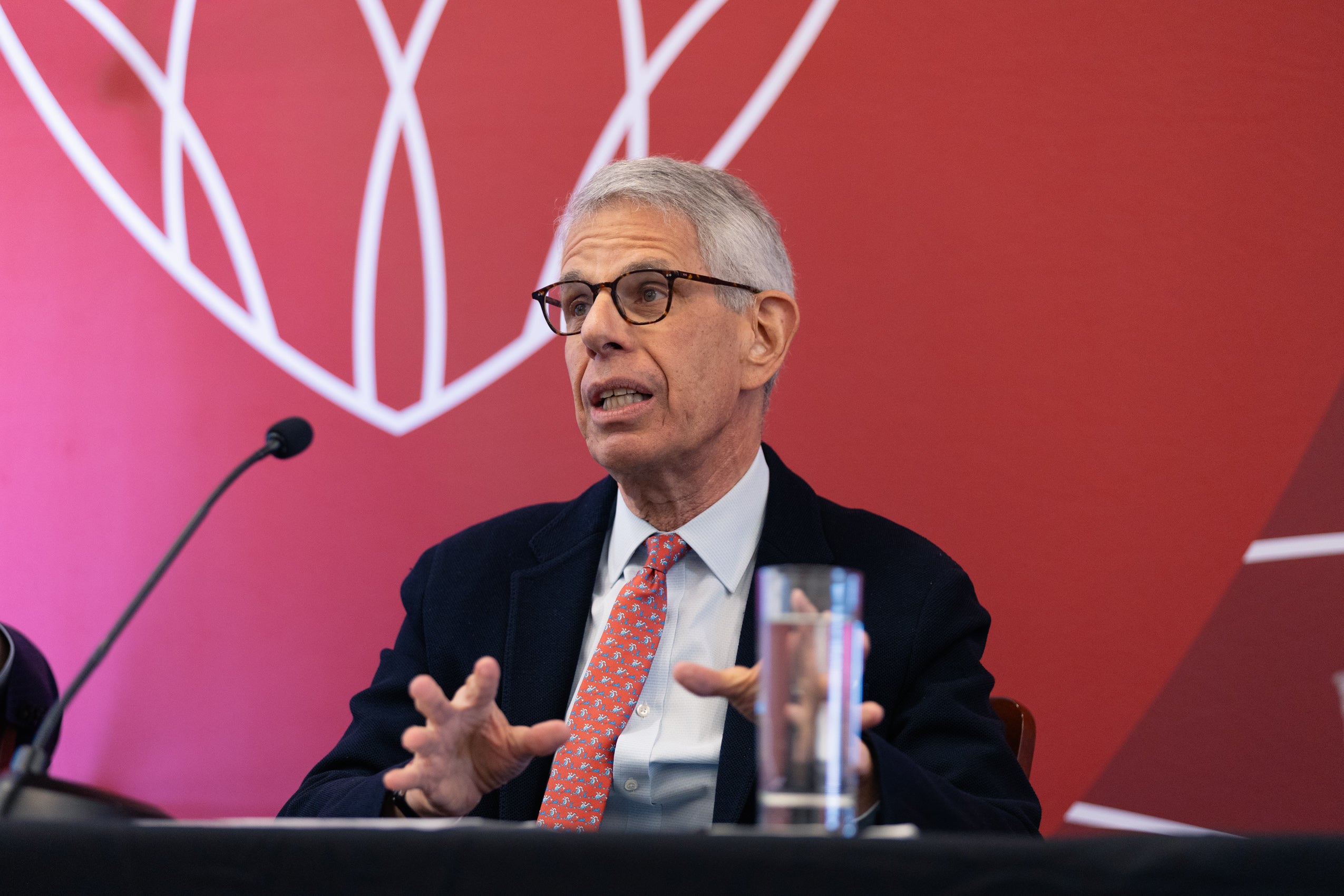
“[The law] was enacted at a time when both political corruption and business corruption were far more prevalent in our society and in the world than it is today,” Sorkin began.
The law succeeded in cleaning up much of this kind of bad behavior by U.S. public companies in its early years, he said, and by the late-1990s, the government began to use the FCPA against parent companies of foreign businesses.
Initially, this did present some challenges for U.S. companies, Sorkin conceded. “How do you figure out if there’s corruption in a company, that’s not your subsidiary, that you’re buying? It’s a very challenging thing.”
But four things have happened in the intervening decades that have since reduced this disadvantage, Sorkin argued.
The first is that a number of other countries around the world, including the United Kingdom and France, now have their own version of the FCPA, with which they are able to restrain their own domestic companies. What that means, Sorkin said, is that “even if the Foreign Corrupt Practices Act is not enforced, there is still plenty of anticorruption law that is enforced.”
Second, non-U.S. companies seeking to be acquired have become more receptive to improving their anti-corruption programs. Local opposition to corruption abroad is part of that story.
Third, it is now much easier for parent companies to perform due diligence before acquiring a foreign business, Sorkin said, as an entire, sophisticated industry has popped up to investigate and consult on these issues.
A fourth point, Sorkin said, is that businesses that violate the FCPA are more likely to be engaging in other undesirable behavior — in other words, the FCPA, rather than inhibiting a company from entering a good deal, can signal that they are at risk of entering into a bad deal.
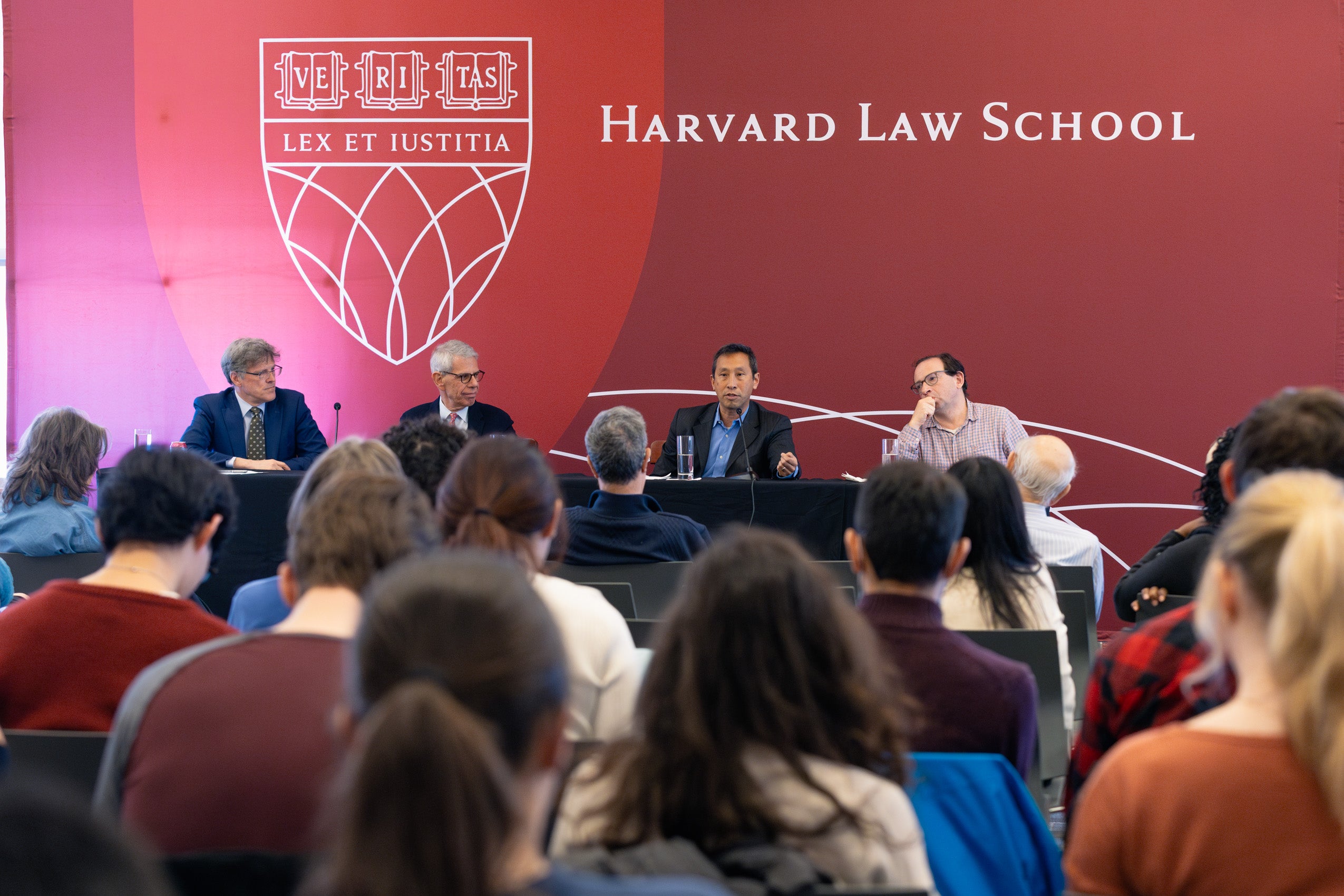
“A company that might pay a bribe,” he said, “is unlikely to also treat its workers well. It’s unlikely to be avoiding environmental degradation. It’s a real ‘canary in the coal mine’ issue.”
Matthew C. Stephenson, the Henry L. Shattuck Professor of Law, was not optimistic that other nations could — or would — make up for America’s lack of enforcement of the FCPA.
In addition to the fact that the U.S. has greater resources and expertise in dealing with these types of cases, Stephenson said, “if you just put together FCPA enforcement actions, the United States has more of them than all of the other countries that are parties the OECD [Organisation for Economic Co-operation and Development] anti-bribery convention combined. And it’s not close.”
And a big reason some countries have laws on this, he added, is because otherwise, their companies could be prosecuted under the U.S. legal system instead of their own. Without this incentive, he suggested, anticorruption enforcement might decline elsewhere too.
How successful has the law been in stopping corruption? “It’s always hard to measure the success of these kinds of things. Corruption, famously, is an activity you don’t often ‘see,’” unlike a more obvious crime such as murder, Stephenson said.
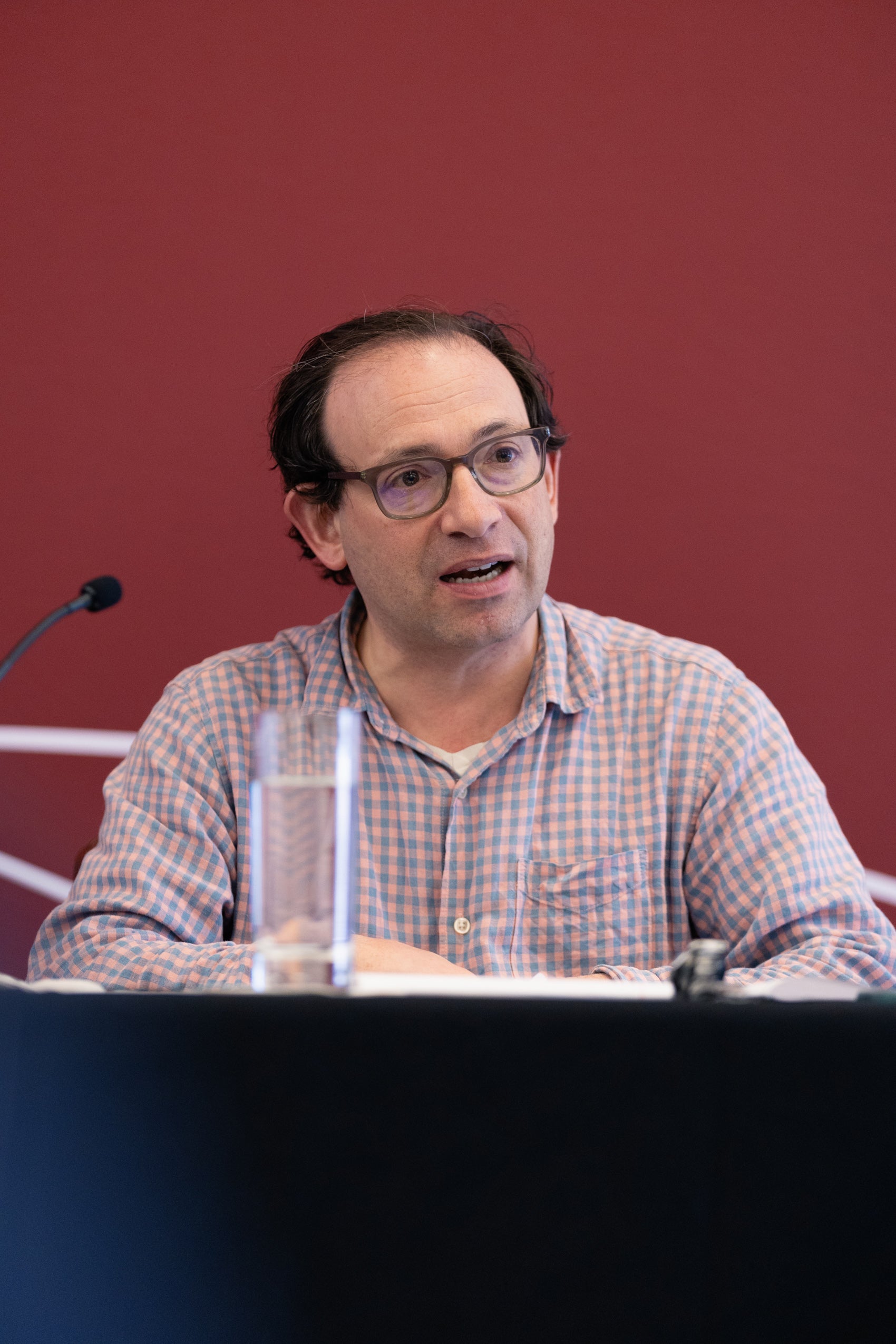
But notably, the law “has commanded fairly broad-based support across administrations,” at least until President Trump, he said.
According to Stephenson, companies have devoted copious resources to avoiding liability under the law for the last few decades. And today, their view of the law is mostly positive, he said. “Although there have always been elements in the American business community that are hostile to the FCPA, big chunks of the American business community are actually pretty supportive of the FCPA.”
One reason is because it can bolster the reputation of American companies. “Sometimes foreign procurement officers would like to deal with American companies, because otherwise they would be suspected of having been involved in corruption.”
American companies also benefit from the law, Stephenson argued, by helping them save face while refusing payola.
“If you’re in a conversation with a government official and you’re getting towards the end and they start subtly hinting, or not so subtly hinting, that they would like a gift, a favor, or something,” he said, the law gives companies an out. “[W]hat sometimes firm representatives are able to say is the equivalent of, ‘I’d love to help you out … But with these crazy zealots back in Washington, D.C., I could go to jail, you could get in trouble.’”
Stephenson worried that, despite the FCPA’s long statute of limitations — which Sorkin had also noted — the Trump administration’s pullback in this area could have lasting implications for the government’s ability enforce the law in the future. “It’s not like you can overnight build up the kind of capacity in the Department of Justice that existed previously.”
The loss of American authority on this issue is a “big blow,” Stephenson concluded. “It’s hard to understate how much U.S. leadership on anticorruption has really mattered over the last generation or so in all sorts of ways.”
Tariffs, trade, and tradeoffs
Echoing Stephenson’s point, Mark Wu, the Henry L. Stimson Professor of Law, argued that the U.S. has long been a major force in shaping the rules that underwrite the global economy.
“But for the better part of a decade or so,” Wu said, “the United States has been a bit of an outlier compared to even other like-minded states in terms of how it would like to change or deal with some of the inadequacies of the current rules-based order, in terms of dealing with the effects of globalization.”
The last few administrations have seemed to agree that change is needed, yet there has been no consensus between — or even within — political parties about what those changes should look like, Wu continued.
President Barack Obama ’91, tried to forge accords with trading partners, but ultimately couldn’t convince these countries to move enough on progressive priorities such as labor and the environment, or to close loopholes available to nations outside of these agreements. President Trump imposed tariffs during his first term — but in a more limited way than what is happening today, Wu said. And while President Joe Biden kept some of those tariffs, Wu continued, he also reengaged with allies, particularly on technology and export controls.
“I think what the Trump administration has concluded is none of these approaches were necessarily radical enough, nor did they get the effect that they sought,” Wu said. Instead, he speculated, the administration’s approach may be to “make one large effort to remake the system, even if we don’t know exactly where this is going to land.”
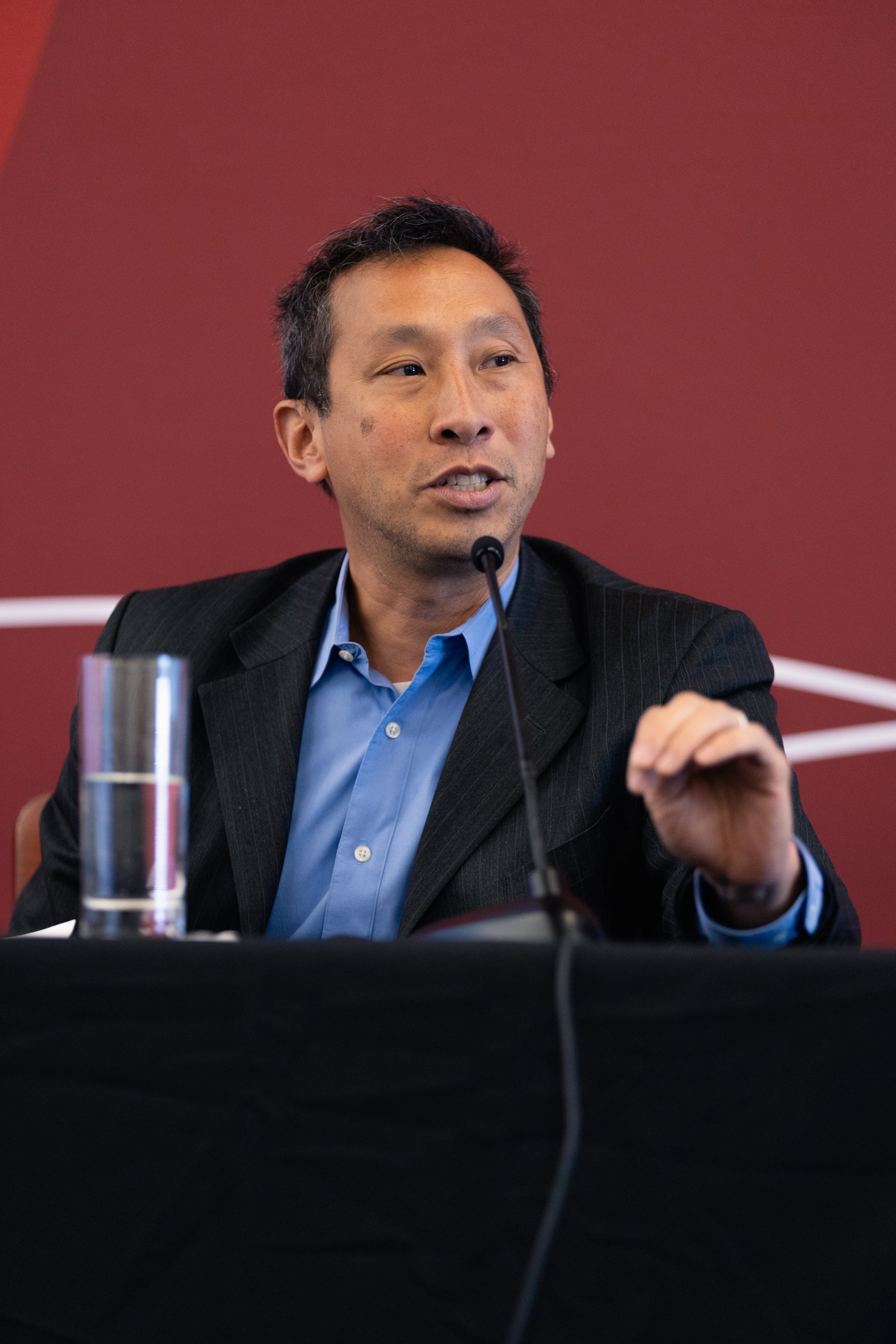
Even with a hiatus on some of President Trump’s tariffs, there are plenty still in place, Wu said, including those impacting specific sectors, such as autos, steel, or aluminum, or issues, such as fentanyl, and a 10 percent baseline tariff on all countries. “If we compare where we are today versus where we were on January 19, tariff rates are much higher than they have been, even with the pause [on the so-called reciprocal tariffs] that was announced earlier this month.”
Wu noted that new tariffs could impact the economy in several ways. “There’s certainly the cost effect. If you’re sourcing inputs or parts, raw materials from countries, particularly if you’re sourcing them from China or you’re producing it all overseas,” these items will be more expensive, Wu said.
A second negative effect is an overall reduction in demand for goods by American consumers, who may be fearful of a “recession on the horizon,” Wu said. Overseas demand could also suffer, he added, either because of retaliatory tariffs or because of an increasingly uncertain economic outlook.
But there could be one positive effect, according to Wu. “As costs go up for your [foreign] competitors, there may be some substituting [toward] those who produce here in the United States. So, we’re seeing these different trends cut against one another.”
Wu suggested that the situation remains “dynamic,” and what happens next depends in part on how other countries respond.
“There’s a lot of uncertainty in the markets,” he said. “Companies are not willing to make investment decisions right now. Not knowing whether these tariffs are here to stay or whether they’re going to go away later on in the future, we’ve seen the markets react very negatively.”
It’s hard to predict where this will end, he said, and it may take several years before we see the full impact of these decisions. This is, Wu argued, “probably the largest shock that we’ve seen since the 1970s.”
The First 100 Days of the Second Trump Presidency is a series of Harvard Law School faculty panels exploring important questions of domestic and international law raised by the administration’s initial efforts to implement its agenda.
Want to stay up to date with Harvard Law Today? Sign up for our weekly newsletter.
